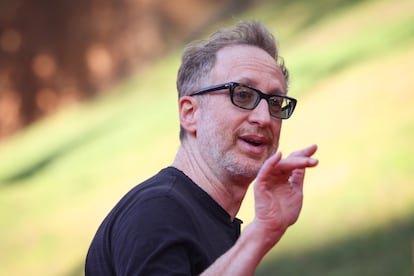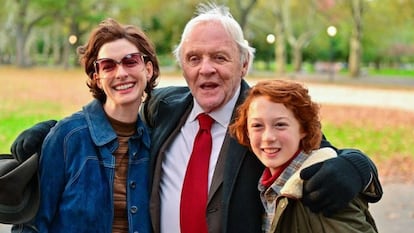Filmmaker James Gray’s long-ago encounter with the Trump family
The New York director’s ‘Armageddon Time’ is inspired by his own childhood and experiences at a private school supported by the former US president’s father


After making a jungle movie (The Lost City of Z) and a space movie (Ad Astra), director James Gray’s hometown of New York City beckoned. “I spent four months in the jungle for the first one,” he told EL PAÍS at Filmoteca Española, Spain’s national film archive in Madrid, where several of his films are being screened this week. “The second one… well, that one didn’t have physical problems,” he says with a melancholic smile, perhaps recalling the final edit that added a narration he hadn’t approved. “I had to rediscover the fun in making films,” he said. What better way to do this than revisit his own childhood in Queens as a Jewish boy from an immigrant family who was the happy-go-lucky class clown at his public school. After an incident at school, Gray’s father, a standoffish sort who irritates his wife to no end, decides to put his son in the Kew-Forest School, a private institution financially supported by Fred Trump during the Reagan era, and attended by his children – Maryanne and Donald. The film then explores the ups and downs of an emotionally fragile boy trying to cope with adolescence. Armageddon Time premiered at the Cannes Film Festival in May, and is now in US theaters.
This is Gray’s first film that tells a story with some elements that will be familiar to audiences. “Back in the 1980s, the Trump family meant nothing to me… except for the school. I remember being moved by a speech Maryanne Trump [the former president’s sister] made to the students. I couldn’t find any recordings of that speech, so I pieced it together from memory,” said Gray. “The huge impact of that family on my country is so strange – I had to show it… Anyway, after the recent midterm elections, Armageddon Time might become even more relevant, because we have to keep fighting racism and anti-Semitism. For me, the film is a ghost story full of echoes from my past. Making this film was nostalgic for me. And yes, now we know some things that help us see the story from a different perspective. I stole the idea from the scene in Fellini’s Amarcord [1973] where crowds are laughing and cheering ‘Duce, Duce!’ [the nickname of National Fascist Party leader Benito Mussolini]. Fellini and the audience both knew that soon there would be nothing to laugh about.”
At times, Gray’s film evokes Haneke’s The White Ribbon (2009): the children who do awful things are the Nazis of the future. “Time can be good or bad for art and artists. Claude Monet was once invited to an exhibition of paintings at the famed Boussod gallery. Monet ignored Boussod and focused on a painting by a little-known artist named Vincent van Gogh. Who remembers Boussod nowadays? The relevance of a film can only be appreciated at least 10 years after its release,” said Gray.

Armageddon Time is a New York family reunion of sorts for James Gray, as well as a rumination on American immigration. It’s a setting dominated by a stern and serious father who is counterbalanced by a warm and loving mother. “That’s exactly what was going on in my house. I didn’t help, either. I was... rebellious.” In another interview, Gray confessed that he should have done more as a child and as a filmmaker. “I should have stood up for my neighborhood friends when they were being bullied. I should have defended my Black friend against those private school assholes... But I wanted to be accepted by them, and as a kid I didn’t have any emotional tools... I didn’t even feel guilty about it. Life is fucked up for everyone, and lots of things happen that we’re unprepared for. I hope that I have more courage now... Or maybe not, and I’ll screw up once again. Right now, I’m hooked on books about wars, especially the two world wars. No one knows who will become a war hero – it’s unpredictable.” What about as a director? “Well, the answer is the film itself.”
The roller coaster of life
A recurring theme in Gray’s movies are the small details or decisions that radically change lives. For Gray and the boy in Armageddon Time, it was when he went from public-school kingpin to private-school peon. “It’s so easy to judge the characters in a movie and categorize them as good or bad, moral or amoral! But real life is never like that,” said Gray in his deep voice, who often speaks like he’s thinking out loud. “Back in the 1980s, we lived through an economic boom that created more social inequity, and 10% of the population ended up with almost all the wealth. Life became a struggle for the other 90%, and we shouldn’t make simplistic judgments about the decisions they made to survive.”

Gray says that he also had to change. “When I was a kid, my goal was to get rich. I realized in my twenties that it wasn’t going to happen, because I was already working in the film industry. So I aspired to become a great director. In my mid-thirties, I realized that I wouldn’t become one of the greats, so now I just want to make my films as good as possible, and I want them to speak to people. Making films requires a blend of art and business. I lean more toward art – it’s a shaky balancing act.” Maybe that’s because as a kid, Gray was a sci-fi fan and loved anything about outer space. Gray and his friend didn’t steal a computer from school like the kids in the movie, but they did try to steal two $50 blueprints for the Entrerprise, the spaceship from Star Trek. “We got caught and didn’t even make it out the front door of the store.”
When Gray was promoting Ad Astra in 2019, he talked a lot about Joseph Campbell and his book, The Hero with a Thousand Faces. It’s a book about mythical heroes and their formative journeys. While the book didn’t necessarily focus on Oedipus, that particular figure’s presence was occasionally felt in Ad Astra, which starred Brad Pitt. “There will be time for Oedipus later,” he used to say. Perhaps Armageddon Time is that time. “We need fantasy. We’ll always want those Campbell heroes, but no one should believe life is really like that. It’s stupid... As for Oedipus...” Gray laughed and said, “Let me tell you a story. My wife went on a trip to Canada with my two older children, and I stayed home with the little one, who was nine years old. I told him we could do whatever he wanted that day. He said he wanted to eat dumplings at Huntington Gardens [a botanical garden in Pasadena, near the Grays’ home in Los Angeles], and then come home for lemon-chicken dinner. After dinner, we watched Sergio Leone’s Once Upon a Time in the West. I tucked him in bed and told him my best bedtime story ever. A lightning bolt outside flashed over his face, and he looked like an angel. I’ve never felt such tender love. The day had been perfect. I kissed him goodnight and said, ‘I love you.’ And he answered, ‘I would never kill you, daddy’.”
Tu suscripción se está usando en otro dispositivo
¿Quieres añadir otro usuario a tu suscripción?
Si continúas leyendo en este dispositivo, no se podrá leer en el otro.
FlechaTu suscripción se está usando en otro dispositivo y solo puedes acceder a EL PAÍS desde un dispositivo a la vez.
Si quieres compartir tu cuenta, cambia tu suscripción a la modalidad Premium, así podrás añadir otro usuario. Cada uno accederá con su propia cuenta de email, lo que os permitirá personalizar vuestra experiencia en EL PAÍS.
¿Tienes una suscripción de empresa? Accede aquí para contratar más cuentas.
En el caso de no saber quién está usando tu cuenta, te recomendamos cambiar tu contraseña aquí.
Si decides continuar compartiendo tu cuenta, este mensaje se mostrará en tu dispositivo y en el de la otra persona que está usando tu cuenta de forma indefinida, afectando a tu experiencia de lectura. Puedes consultar aquí los términos y condiciones de la suscripción digital.








































